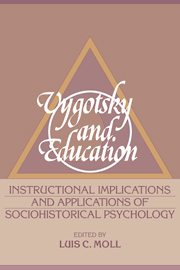Book contents
- Frontmatter
- Contents
- List of contributors
- Preface
- Acknowledgments
- Introduction
- Part I Historical and theoretical issues
- Part II Educational implications
- Part III Instructional applications
- 11 Changes in a teacher's views of interactive comprehension instruction
- 12 Learning to read and write in an inner-city setting: A longitudinal study of community change
- 13 Writing as a social process
- 14 Creating zones of possibilities: Combining social contexts for instruction
- 15 The zone of proximal development as basis for instruction
- 16 Detecting and defining science problems: A study of videomediated lessons
- 17 Assisted performance in writing instruction with learningdisabled students
- Name index
- Subject index
17 - Assisted performance in writing instruction with learningdisabled students
Published online by Cambridge University Press: 05 June 2012
- Frontmatter
- Contents
- List of contributors
- Preface
- Acknowledgments
- Introduction
- Part I Historical and theoretical issues
- Part II Educational implications
- Part III Instructional applications
- 11 Changes in a teacher's views of interactive comprehension instruction
- 12 Learning to read and write in an inner-city setting: A longitudinal study of community change
- 13 Writing as a social process
- 14 Creating zones of possibilities: Combining social contexts for instruction
- 15 The zone of proximal development as basis for instruction
- 16 Detecting and defining science problems: A study of videomediated lessons
- 17 Assisted performance in writing instruction with learningdisabled students
- Name index
- Subject index
Summary
In recent years, there have been many theoretical advances in the conceptualization of the processes involved in childrens' development and learning. This includes, for example, much greater emphasis on the social and interactive nature of these processes, as emphasized in the work of the sociohistorical tradition (Vygotsky, 1978). These developments have begun to influence, in a profound way, the conceptualization and teaching of literacy, one of the major objectives of formal education. For a variety of historical and other reasons, these developments have only very recently begun to infiltrate the instruction of mildly handicapped students. However, these theoretical notions have the potential to reshape radically the nature of literacy instruction for students whose academic achievement is sufficiently low that they come into contact with the special education system.
In this chapter, the Vygotskian approach to one aspect of literacy, namely written language, will be explored with special attention to mildly handicapped and learning- disabled students and compared with other prominent theoretical approaches. Following this, the chapter will briefly review the literature on mildly handicapped students and writing, including the use of microcomputers, with a critical analysis of traditional instructional practices. In addition, the implications of a Vygotskian approach for mildly handicapped students will be discussed. Finally, examples will be provided of the application of the Vygotskian approach to writing, including an interactive writing experience with learning-disabled students.
- Type
- Chapter
- Information
- Vygotsky and EducationInstructional Implications and Applications of Sociohistorical Psychology, pp. 403 - 426Publisher: Cambridge University PressPrint publication year: 1990
- 10
- Cited by



